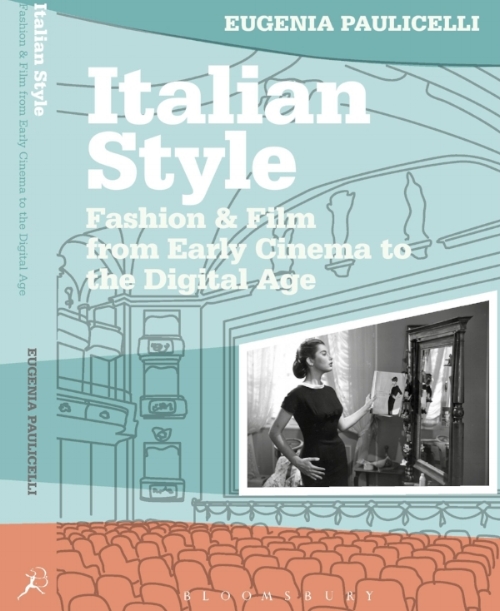Italian Cinema Launched Italian Fashion to the World

Italian Style: Fashion & Film From Early Cinema to the Digital Age (now available in paperback) is the first in-depth, book-length study on fashion and Italian cinema from the silent film to the present.
The creation of an Italian Style and fashion as they are perceived today, especially by foreigners, was a product of the post World War II years. Before then, Parisian fashion had dominated Europe and the world. Just as fashion was part of Parisian and French national identity, the book explores the process of shaping and inventing an Italian style and fashion that ran parallel to, and at times took the lead in the creation of an Italian national identity. In bringing to the fore these intersections, as well as emphasizing the importance of craft in cinema, fashion, and costume design, the book offers new visions of films by directors such as Nino Oxilia, Mario Camerini, Alessandro Blasetti, Federico Fellini, Michelangelo Antonioni, Luchino Visconti and Paolo Sorrentino, of film stars such as Lyda Borelli, Francesca Bertini, Pina Menichelli, Lucia Bosè, Monica Vitti, Marcello Mastroianni, Toni Servillo, and others, and the costume archives and designers who have been central to the development of Made in Italy and Italian Style.
The book also features appendices containing interviews with fashion and costume designers such as Fernanda Gattinoni, Massimiliano Attolini, Adriana Berselli, and Maria Teresa Allegri (Annamode); as well as Dino Trappetti of the Fondazione Tirelli, Rome and photos from the archive of the photographer Giuseppe Palmas.
The book is a scholarly investigation of the intersection between Italian fashion and film, both very powerful industries and media machines that shape and construct equally powerful symbolic narratives and identities. It is hardly surprising, then, that filmmakers have been fascinated by the transformative power of the language of clothing and fashion and the impact it has on style, consumption and behavior.
All the films examined in the book are concerned with the negotiation of modernity. Fashion is as much a negotiation with modernity as is film; both fashion and film expose the seams of technology. Clothing in film has a highly symbolic charge that affects the wearer and his/her perception in any social space. More specifically, clothing, fabrics, shapes, color and textures frame the apperception of the self. Clothing materializes a sentient way of perceiving the body in space. Materializing the dynamics of image and copy, the natural and the technological, costume and clothing in film take on the form of a dense and precise essay on language and signification. To explore Italian Fashion with me, please watch the lecture presented at New York University, and click the “Learn More” button below:
In Praise of the Book
“This critically elegant and highly readable book tackles anew how fashion and cinema combine social history with aesthetics. Impressively well researched, Italian Style, is a compelling exploration of how the fashion industry and its costume designers shaped the cultural context of national identity. With vigor and clarity, Paulicelli illuminates such films as Fellini’s Roma, Antonioni’s Le amiche, and Sorrentino’s La grande bellezza. A must-read for anyone with an interest in cinema and passion for this glorious art.”
Gaetana Marrone, Professor of Italian, Princeton University, USA
Gaetana Marrone, Professor of Italian, Princeton University, USA
Paulicelli’s book is a tour de force of film and fashion scholarship, a beautifully written and authoritative exploration of Italian national identity that will appeal to a wide readership. In mapping out Italy’s rich cultural heritage from early twentieth century modernism, through the economic miracle years to the present day, this book sets out to do nothing less than define Italian style as embodied by the dialogue between fashion and film. That Italian Style achieves this is testament to its brilliance.
Stella Bruzzi, Professor of Film and Television Studies, University of Warwick